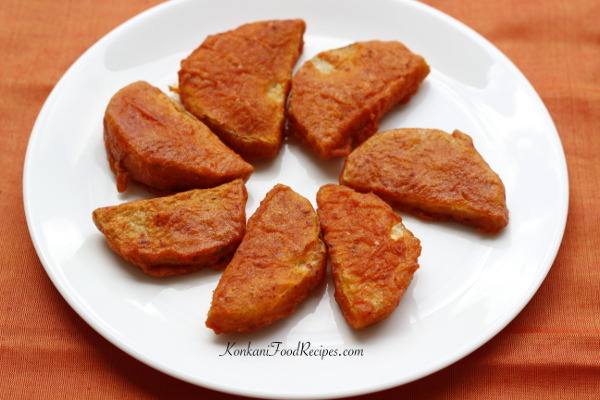Taro Roots Fritters (Kaale Alvaa Maddi Phodi)

Colocasia tubers are called kaale alva maddi or maddi in Konkani. They make yummy fritters when are shallow fried or deep fried. These fritters are called maddi phodi in Konkani and are a Konkani cuisine favourite.
Below is the recipe to make deep fried, spicy, colocasia tuber fritters (maaddi phodi). You'll find the recipe for shallow fried, colocasia fritters here.
Konkani cuisine also makes delicious, spicy, side dishes using colocasia tubers. In Konkani they are called bon (maddi sukke), maddi koot, tambut (pickle) and maddi sasam. The tip of colocasia tuber is made into a stir fry (maddi venteche upkari). Colocasia tuber chips are sold in shops. And the most popular Konkani dishes are shallow fried and deep fried colocasia tubers called as maaddi phodi or kaale alva maddi phodi.
Here goes the recipe to make deep fried colocasia tuber fritters called as maaddi phodi or kaale alva maddi phodi in Konkani.
Ingredients:
- 1 colocasia tuber
- 1 cup rice
- 6-7 dried red chillies
- 2 tablespoons of tamarind
- Salt to taste
- Oil for deep frying
Serves: 3-4 depending on the size of the tuber.
Preparation Time: 55 minutes
Preparation Method:
1. Soak rice in water for a minimum of 30 minutes. Meanwhile prep the colocasia tuber.
Prepping the colocasia tuber:
2. Peel the colocasia tuber, cut them into slices, then wash them without bringing your hand in contact with colocasia tuber. Once the maaddi comes in contact with water, it itches your hand. So, wash it after you chop it.
Size and shape of the pieces is a personal choice. Any size, any shape, any thickness will do. Preferably keep them a little thick so that you get a mouthful with every bite.
Or you can chop them into slices & then chop off the peel using a knife.
Apply tamarind water, lemon juice to your hands before chopping the maaddi to prevent itching. The best way to prevent itching is to wash the maaddi without touching it with your hands and then strain the water using a strainer. Apply tamarind water/lemon juice to your hands to stop itching in case your hands have come in contact with the maaddi. (Apply thick tamarind juice and leave it for 5 minutes, then wash it off.)
You don't want to experience the itching! I wish somebody had told me these things the first time I handled the tuber/maaddi. Or you can wear hand gloves while dealing with the tuber. :-)
3. Pressure cook the colocasia slices with salt and 1 cup water. Make sure you put off the pressure cooker before the whistle blows or else they overcook.
4. Strain the water. Once the slices cool down, deep fry them, coated with the batter.
Preparing the batter:
5. Wash and strain the rice grains after 30 minutes of soaking. Grind them with red chillies, tamarind and salt into a smooth paste using as little water as possible. We need a medium thick batter.
6. Transfer the ground batter into a bowl, check and adjust salt.
7. Add very little water if required. We want the batter between dripping thin and thick consistency. We want the batter to stick to the colocasia tuber pieces. If the batter's watery then it'll drip off the colocasia tuber pieces.
If the batter gets watery, you can thicken it by adding a few teaspoons of gram flour.
8. Heat up the oil for deep frying.
9. Add the colocasia tuber pieces into the batter, coat them uniformly with the batter and then deep fry them until they are cooked through.
10. Serve them hot and enjoy!
Serving suggestion:
Colocasia tuber fritters are served as a side dish for lunch, dinner. You can also serve them as a starter.
Other colocasia tuber dishes of Konkani cuisine:
Taro Root Spicy Side Dish (Kale Alva Maddi Sukke, Bon)
Crispy, shallow fried colocasia tubers in spicy side dishes (Maddi tambut, maddi adgai, maddi koot)
Shallow Fried Colocasia Tuber (Maaddi Phodi)
Find more fritter (bajo, phodi) recipes here.
Tags: Kale alva maddi phodi, maddi phodi, colocasia tubers, taro roots, fritters, maaddi
Chauthi, Ganesh chaturthi, chauti



Tweet